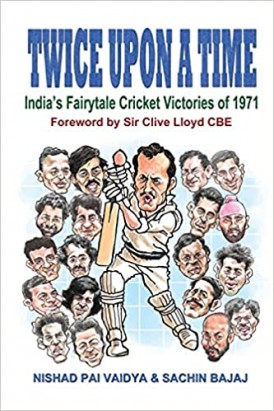Twice Upon A Time
Martin Chandler |Published: 2021
Pages: 248
Author: Bajaj, Sachin and Vaidya, Nishad Pai
Publisher: Notion Press
Rating: 3.5 stars

Indian cricket had a busy year in 1971, with plenty of travelling. First of all the country was due in the Caribbean to play a five Test series. The last time they had done that they had lost 5-0, and in their only previous series in the West Indies they had lost as well, albeit with a more creditable 1-0 scoreline. After their West Indian sojourn the Indians were then due in England. India had never won a Test in England, and had lost all but one of their last twelve. History did not suggest that the Indians had very much hope in either contest.
By the end of August however history had been turned on its head. India had avoided defeat throughout the eight Tests they had played, and better than that won in Port of Spain and at the Oval to take both series. The Indian writer Sunder Rajan published modest accounts of each tour, and Brunell Jones from Trinidad one on the West Indies trip. That was all however, so there was every reason for Indian writers to celebrate this year’s fiftieth anniversary of such momentous events.
And a celebration is very much what Twice Upon A Time Is. It is certainly not a dry history, and it can’t be described as a tour account, well not in the traditional sense anyway. What it is is a collection of short essays. Between a few brief introductory writings, and the book’s conclusion of a selection of pen portraits of the Indian tourists, there are as many as 71 of these short snappy pieces. They do take a chronological trip through the two tours, and there is a continuous thread, but there is little in the way of description of the actual play (although that is not, I hasten to add, a criticism).
In truth I don’t suppose there will be too many readers who will pick up Twice Upon A Time and are unaware of the story of Indian cricket in 1971, which is just as well as there is probably insufficient substance to make it a truly satisfying read on that basis. But for anyone who does know the story there are plenty of insights in the book, and a few surprises as well.
Some of the stories are purely cricketing ones. That, for example, Ajit Wadekar wanted all his spinners to slow down their over rates in order to more closely match the rates achieved by the West Indies’ largely pace dominated attack came as a surprise to me. So too did the news that the great Garry Sobers had put Sunny Gavaskar down right at the start of his first Test innings. Gavaskar went on to score 65 then, and of course 774 at 154.80 in the series as a whole, but perhaps if he had had a setback in that first knock history might be different? Almost certainly not of course, but it is an interesting thought.
A number of the book’s tales speak volumes as to the team spirit of the Indians, and there are plenty of smiles to be found. Dilip Sardesai’s pranks on roommate Salim Durani in Trinidad brought a smile to my face. The episode in Dominica involving the local delicacy ‘mountain chicken’ must have caused great amusement amongst the tourists, or at least those who decided not to partake. On a slightly different note I was also much impressed with the attitude demonstrated by opening batsman Ashok Mankad in England. Poor Mankad scored just 42 runs in his six Test innings, but stayed in the Test team because he could not stop scoring in the other matches.
The material in Twice Upon A Time comes from a wide range of books, magazines and similar sources something which, during a global pandemic, has its advantages, although it may have added to the depth of the finished product had their been some contemporary reflections, half a century on, from the men who won the matches. Nonetheless whilst the book is certainly no heavyweight it is a thoroughly entertaining read, has a splendid title, and whilst there may not be a photographic section that is more than made up for by the presence of twenty caricatures from the pen of the very talented Austin Coutinho. This one is certainly worth a look.






Leave a comment